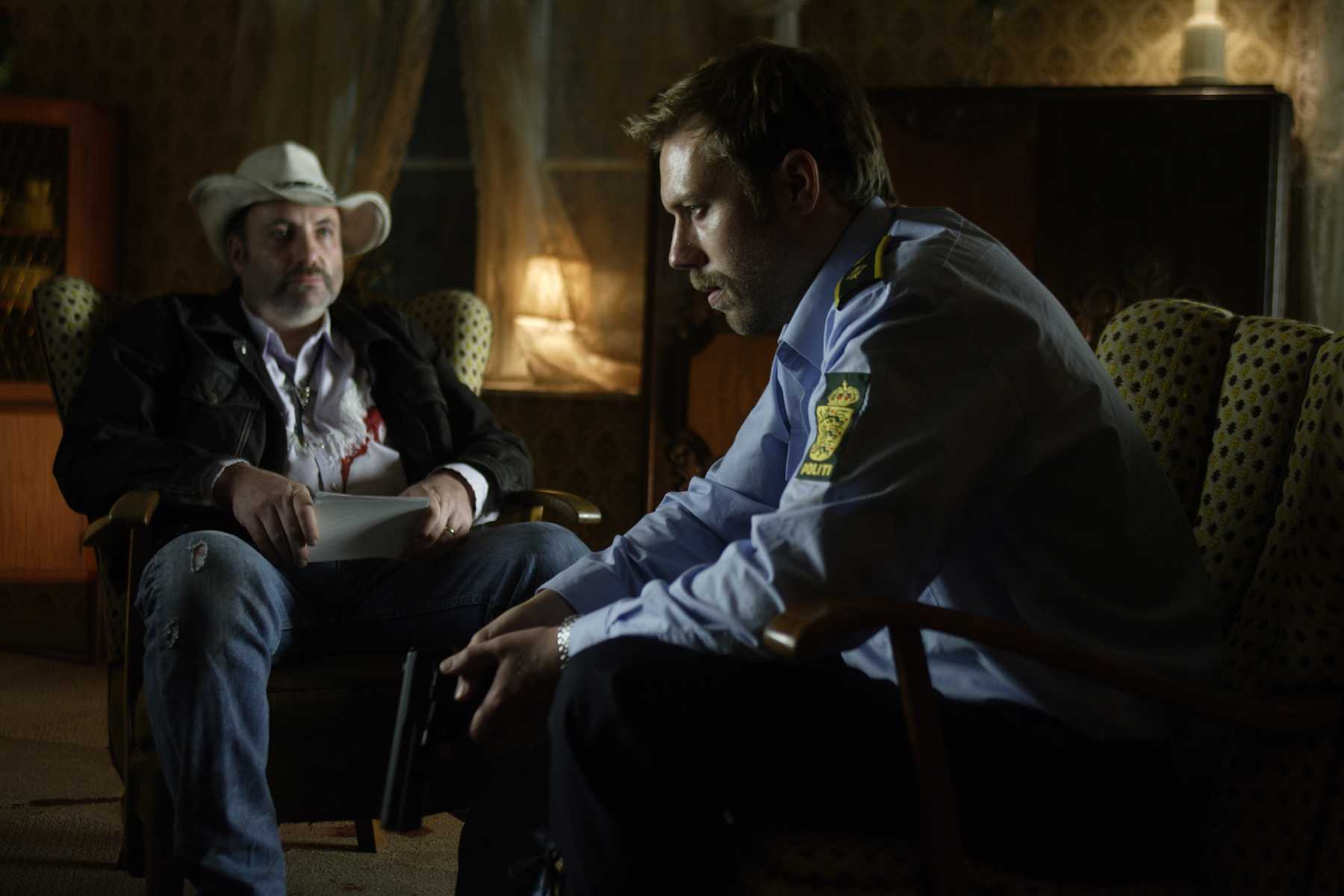Adrien Brody, Topher Grace, Lawrence Fishburne, Alice Braga, and Danny Trejo, among others, find themselves stuck in another world’s Most Dangerous Game in the new trailer for Robert Rodriguez’ Predators. Eh, maybe.
Tag: Cinema
Le Prisonnier.
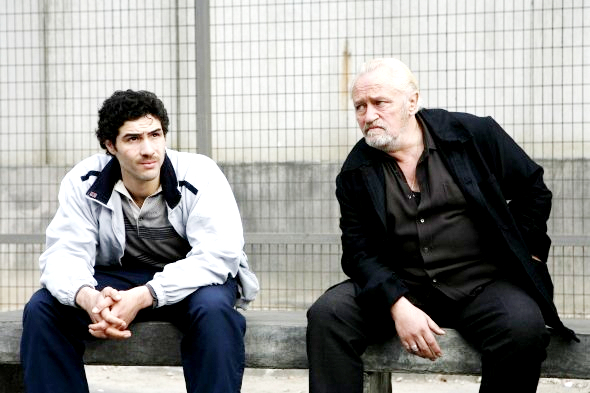
For even as our main character Malik (Tahar Rahim) wiles away years in “the corner of his room” in a French prison, he’s always watching, his mind’s always whirring. A Prophet is possessed of that same quiet, impressive, and inexorable intelligence. Audiard’s movie feels a bit on the long side, and, as you might expect from any movie about life in the Big House (even a French Maison Grande where everyone has separate cells and au bon pain is served on the regular) it can be hard to sit through at times. But it’s also a film that keeps making clever choices, lingering on a small detail or adding that little extra flourish that really makes various scenes resonate.
As A Prophet begins, our young prisoner is being processed for a six-year-stint in the joint for crimes unknown, although it sounds like roughing up a cop was involved. With no family or friends to speak of and a lousy public defender (Rabah Loucif) who just wants the paperwork cleared so he can get paid, Malik enters jail with nothing to his name except a desiccated cigarette and one 50-franc note. How could things get worse? Well, for starters, Cesar Luciani (Niels Arestrup) — the head of the Corsican gang who are the reigning ethnic power in Malik’s prison — may decide he wants an Arab prisoner (Hichem Yacoubi) murdered, and that Malik is just the fresh meat who can get into the Muslim block and get the job done. Hey, everybody’s got to start somewhere.
After wrestling with this dirty deed and its consequences, and picking up an unorthodox roommate, Malik goes from working in the prison’s blue jean factory to being the Corsicans’ new cook, maid, and whipping boy. He starts to make more friends, like Ryad (Adel Bencherif), the testicular cancer survivor who teaches him to read, and Jordi the Gypsy (Reda Kateb), the guy to go to for the quality hash. He starts to understand the prison’s racial fissures, like the great divide between the Corsicans (who treat like him an Arab, and who happen to have the guards in their pocket) and the Muslims (who treat him like a Corsican, and whose numbers are growing.) And, particularly after he establishes some friends on the outside, he starts seeing some angles to make some real money…if his Corsican masters will let him and live.
As critics go, I’m not usually a fan of the NYT’s Manohla Dargis, but her blurb in this trailer — “precisely observed” — is a very good way of putting this movie’s main strength. Time and again, A Prophet colors in its margins with small, wordless, and often devastating details. We watch Malik slice up his mouth over and over again as he tries to learn how to squirrel a razor blade in his cheek. After a day-long furlough that brings him to the beach, we see him slowly run the sand from his shoe through his fingers. When Malik one day gets on a flight, he initiates his full-cavity-search rigamarole in the security line, expecting no different from the French TSA than what he gets in prison every night.
Like I said, there are some scenes in A Prophet that can be hard to watch, and a few of the usual arthouse types at my Saturday afternoon viewing walked out. This is prison after all, and no Green Mile Oscar-bait prison either. Still, while I don’t think I’d want to see it again anytime soon, the movie definitely has moments of real grace, beauty, and haunting power. (Along with the aforementioned penchant for great novelistic details, I especially liked some of the deliriously creepy “dream” sequences in Malik’s prison cell, and particularly as they become normalized to him over the years.)
Did I like A Prophet better than Terribly Happy? Hmm, hard to say — they’re very different kinds of films, this one as sprawling and Scorsesean as Happy was lean and Coen-y. But, of the Best Foreign Film nominees in 2010, this was a much more worthwhile flick than The White Ribbon, and if The Secret in Their Eyes is better, it must be really something.
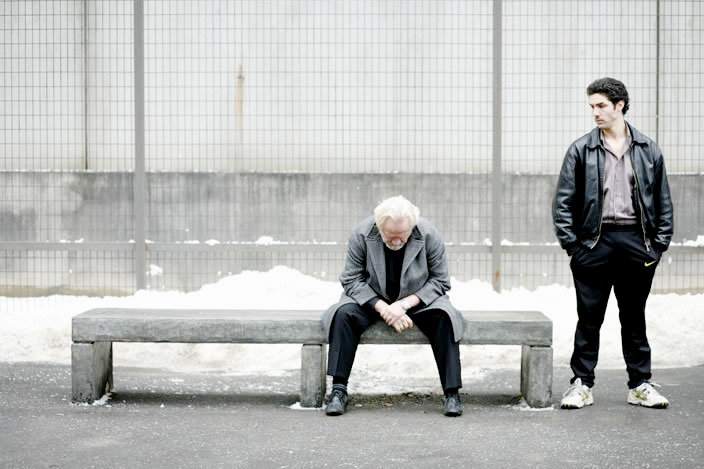
It’s Not Easy Being Green.
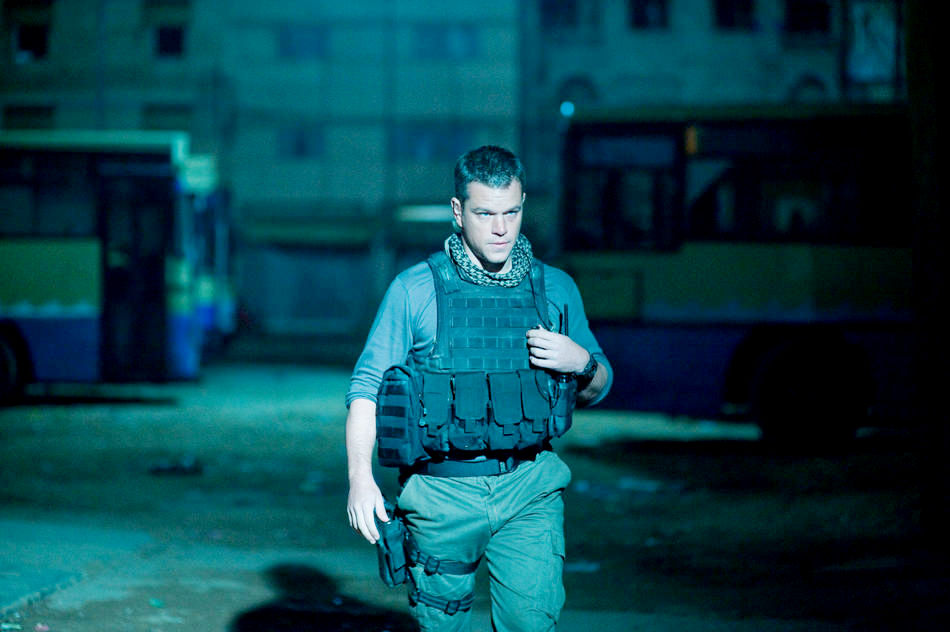
On this St. Patrick’s Day, what better recent release to discuss here at GitM than Paul Greengrass’ Green Zone? Not only do we have two shades of emerald in that last sentence, but we’re now on the cusp of the 7th anniversary of the beginning of the War in Iraq. (It broke out, I well remember, just as I was heading to a March Madness weekend in Vegas.) Alas, I just wish I had a better sitrep to report.
I don’t mean to be too harsh — There’s nothing terribly wrong with this edutainment-y attempt to explain de-Baathification, highly dubious detainee procedures, and most notably the faked WMD casus belli to disinterested laypersons by way of action-thriller. And, in a way, I sorta admire the gutsiness of the the attempt. But, if you were already well aware of these grim developments, and I assume most GitM readers are, then it’s hard to escape the sensation that one is mainly just being talked down to for two hours. Wait, there were no WMD in Iraq? You’re kidding me, right? And, while I’m a great fan of Greengrass’ previous output — I said over and over again in this space that I wish he had stuck with Watchmen, and on the Top 100 films of last decade list, Bloody Sunday was #84, his two Bournes were at #49, and the exemplary United 93 was at #6 — The Green Zone feels quite a bit more leaden than usual.
As with the political edutainment project Greengrass aspired to here, I like the idea of fusing his highly visceral action work (the Bournes) with his fly-on-the-wall discursions into recent history (Sunday, ’93)…on paper. But The Green Zone gets lost somewhere in the interstice, and lacks the gripping power of either of these previous Greengrass grooves. Instead, Zone ends up mostly being two grainy hours of watching Matt Damon run around at night, as he tries to uncover an insidious government plot that our nation has been fully aware of for years…and has chosen to greet with a yawn.
More on that depressing problem in a bit, but, first, to bring y’all up to speed: Loosely based on Rajiv Chandrasekaran’s Imperial Life in the Emerald City, a non-fiction examination of Dubyaite imbecility and excess in post-war Baghdad, Green Zone begins with a brief sequence set amid the original Shock-and-Awe period of the war, followed by, a few weeks later, a tense raid on a possible WMD storehouse by American soldiers. Led by Chief Warrant Officer Roy Miller (Damon), this crack MW2-ish assault ends up finding, well, bupkis, just like the time before and the time before that.
To Chief Miller, the problem here is obvious — the intel must be rotten. But, when he brings this up at the next briefing for high-level military muckety-mucks, he is basically told to shut up and do his job. Nonetheless, events soon conspire to introduce Miller to the “Jack of Clubs” in the Dubya deck, a Baathist general (Yigal Naor) with a still-clearly extant power base in Baghdad. And, when our hero digs deeper to figure out how this Jack might know “Magellan,” the top-secret source of all this lousy intel, he soon finds himself trapped — along with a very Judith Miller-y reporter (Amy Ryan) — in a power play between a slimy executive branch bureaucrat (Greg Kinnear, stuck no more) and a grizzled CIA hand (Brendan Gleeson), one that might just end up getting Miller fragged by the creepy Special Forces guy (Jason Isaacs, with great accent) who keeps popping up…
Along the way, there’s a digression into a detainee facility with all the makings of an Abu Ghraib waiting to happen, the tearful homecoming of the administration’s hand-picked Iraqi stooge (re: Ahmed Chalabi), some rather pained attempts to make the decision to de-Baathify an action beat…In other words, Green Zone is basically an attempt to dramatize the Iraq war for people who, for whatever reason, weren’t paying much attention the first time ’round. And, to be fair, it’s done with solid acting all around (including several folks recognizable from United 93), quality production values, and a reasonable degree of versimilitude throughout. (Note also the brief Paul Rieckhoff cameo, which should nip any IAVA whining about dramatic license right in the bud.)
But, for all its edutainmenty truths to tell, Green Zone still ends up feeling rather fake and film-ish to me, perhaps in part because — unlike Greengrass’ other recent histories — it seems to subscribe to a very movie-like All the President’s Men view of things, where, once word of misdeed gets out, justice will be done tho’ the heavens fall. Not to get all Debbie Downer up in here, but that’s not really the way the world works anymore, is it? One of the saddest and scariest moments in the recent and very worthwhile Daniel Ellsberg: The Most Dangerous Man in America is when Ellsberg explains how he thought everything would change once the Pentagon Papers got out…and then he finds that, in the face of clear and irrefutable evidence of government wrongdoing, most people just shrugged.
This is the uncomfortable horror that Green Zone almost seems willfully designed not to recognize. The whole premise of the movie seems to be that, if We the People knew what really went down in Iraq (or could just be taught via action-movie), we would be totally livid about the corruption involved. But, is the problem really that the American people don’t know what happened in the build-up to Iraq? Or is it that we know pretty well what happened and don’t much seem to care?
Just as with our indefensible dabbling in torture and indefinite detention in recent years, we have known about the lies and incompetence that fueled the Iraq fiasco for awhile now. And, alas, nothing ever happened. Dick Cheney, Karl Rove, and the whole awful, lying lot are still deemed Serious People with Serious Opinions by the nation’s domesticated media watchdogs, who, by the way, have also been studiously ignoring the Blair hearings overseas. Our current president, elected with the largest mandate for change in a generation, has deemed all of this just the sins of the past and refused to “look backward” (or worse, made himself complicit in these Dubya-era crimes.) And life continues, much as it has this past age, with no sense of reckoning whatsoever for the Big Lies that were told.
One of the main reasons Bloody Sunday and United 93 work so well is that they offer complex, nuanced portraits of complicated times. But, as Green Zone moves along, it just ended up feeling more and more like a cartoon to me, and one predicated mainly on wishful thinking. Like I said, I guess I admire what Paul Greengrass & co. were trying do here, but Green Zone as an action film feels flat and mostly uninvolving. And Green Zone as a political enterprise — Iraq War: The Movie!, basically — often seems at best condescending and at worst dangerously naive.
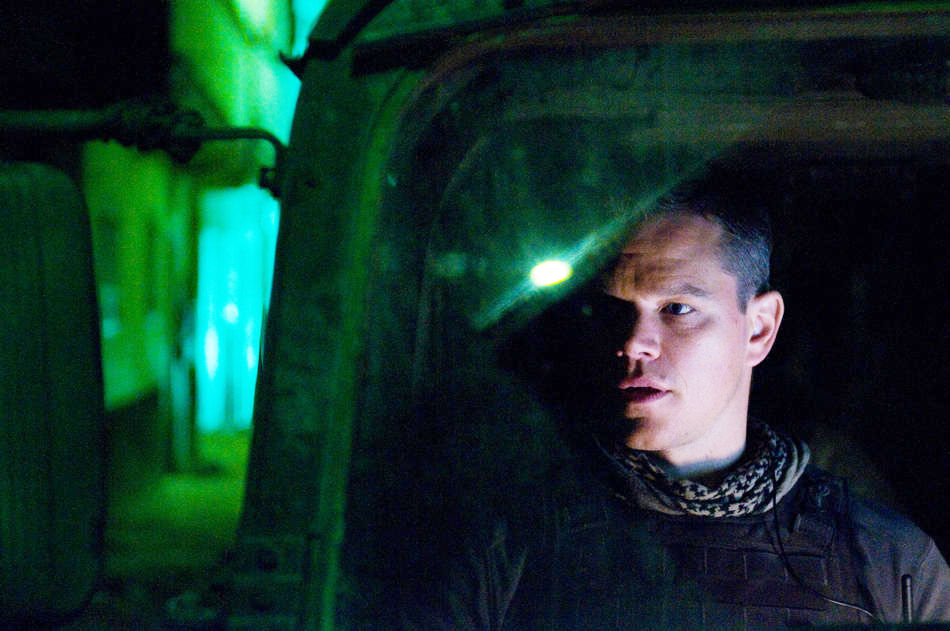
The Dark Knight Returns.
“Without getting into specifics, the key thing that makes the third film a great possibility for us is that we want to finish our story, and in viewing it as the finishing of a story rather than infinitely blowing up the balloon and expanding the story. We have a great ensemble, that’s one of the attractions of doing another film, since we’ve been having a great time for years.” Christopher Nolan discusses Batman and Superman (but no World’s Finest)
Bed-Stuy Flow’s Malicious.
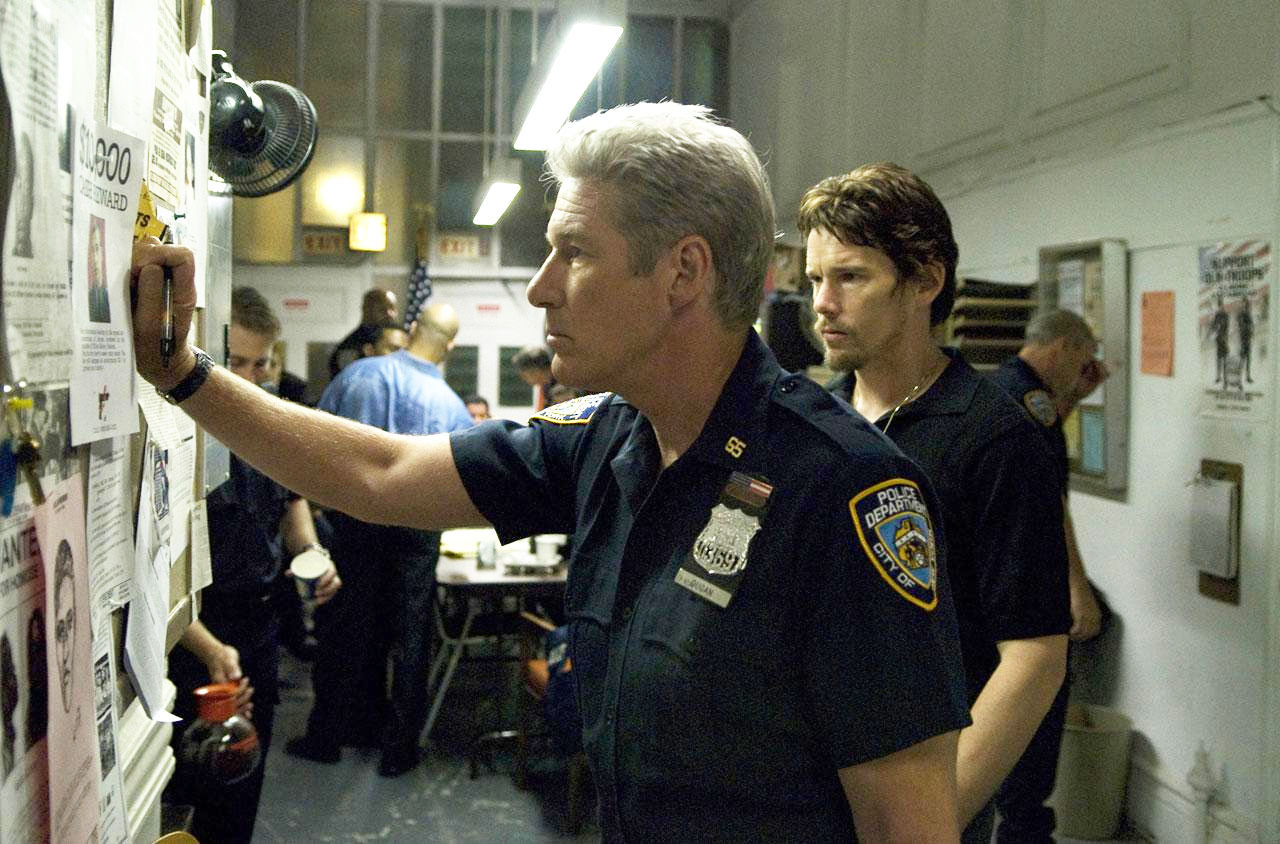
So, in an attempt to get the unfortunately atrocious Alice in Wonderland out-of-mind as quickly as possible, I pulled an audible last Friday night and decided to follow it up immediately with Antoine Fuqua’s conflicted cop saga Brooklyn’s Finest. And, well, I’ll give Fuqua’s film this: At least it turned out to be weirdly lousy, rather than just straight-up lousy like Alice.
Still, despite some quality performances throughout, Brooklyn’s Finest is not a movie I can really recommend. In its gritty street rhythms, shades-of-gray plotting, and all-star cast of dirty cops with streaks of nobility, the film clearly aspires to the greatness of The Wire. (In fact, Michael K. Williams (Omar), Hassan Johnson (Weebay), and Isiah Whitlock, Jr. (Clay Davis) are all in this movie, the latter prompting an hilarious chorus of “shheeeeeeeeeits” at my late-night showing.)
But, for all its admirable ambition, this movie ends up feeling a lot closer to Crash. Like that film (and like another considerably over-praised film of the same type, Babel), Brooklyn’s Finest tells three disconnected stories, seemingly in the hope that they might add up to more than the sum of their parts. But, other than the fact that some of these cops work in the same precinct, and all of them rather implausibly end up in the same apartment block in the climax, they don’ t really have anything to do with each other. Unlike The Wire, where actions on the street (say by Bubbles, or Herc) will reverberate through the system and have unintended consequences that affect the highest levels of the Game (say, the Mayor’s office), nothing that happens in any of these stories has any effect on the other tales being told. In other words, these dirty cop vignettes are basically stovepiped, and, as such, they’re somewhat redundant.
So, instead of one story, you get three. And, also like Crash, the writing’s pretty ham-handed in all of them. For an excellent example of this tendency, look no further than the opening minutes, as — message alert! — Vincent D’Onofrio gives an on-the-nose speel about there being no right or wrong, just “righter and wronger.” Alrighty then. (Speaking of D’Onofrio, between he, Will Patton, and the Wire guys, Brooklyn’s Finest sometimes feels like a Recovery Act-funded jobs program for cop and robber actors. I spent much of the movie half-expecting Michael Rooker to show up.)
So, with the writing dropping the ball rather egregiously, the actors involved have to carry Brooklyn’s Finest on their own for its two and a half hours. And, as it turns out, they’re mostly up to the task. As the working-class Catholic cop in desperate need of some drug money to fix his mold problem (yes, you read that right), Ethan Hawke gives a variation on his twitchy loser from Before the Devil Knows You’re Dead, and is better than the material warrants. (Strangely enough, he’s also once again paired up with Brian O’Byrne.) Meanwhile, Richard Gere is miscast as the lousy, alcoholic peace officer a week out from his pension — I would’ve gone Fred Ward — but he struggles through, despite some excruciatingly embarrassing scenes involving his hooker-with-a-heart-of-gold girlfriend. (One involving fellatio, the other the Honeydrippers.)
And the best third of Brooklyn’s Finest involves Don Cheadle as the Departed-style cop “lost in the Game,” i.e. so deep-undercover he’s forgotten which way is up. This is not only because Cheadle is great, as per the norm, but also because he’s got the ablest supporting cast to work with — the aforementioned Will Patton as his handler, Wesley Snipes in a nod to his New Jack City days, Michael K. Williams as the anti-Omar, and a couple of scene-stealers in Hassan Johnson (who, outside of a well-placed Busta Rhymes track, has the funniest line in the movie) and Ellen Barkin (who aims to prove she has the biggest cajones in the film, by a country mile.)
Still, even tho’ I recently made the case for “actors workshop”-type movies with 44 Inch Chest, actors can only do so much. And, despite the occasional well-performed scene, Brooklyn’s Finest is just too fumbling and Haggis-y in the writing department to really warrant the time investment. Put briefly, Brooklyn’s Finest is to cop movies what Milwaukee’s Best is to beer — only a worthwhile option if you’re intentionally slumming it.
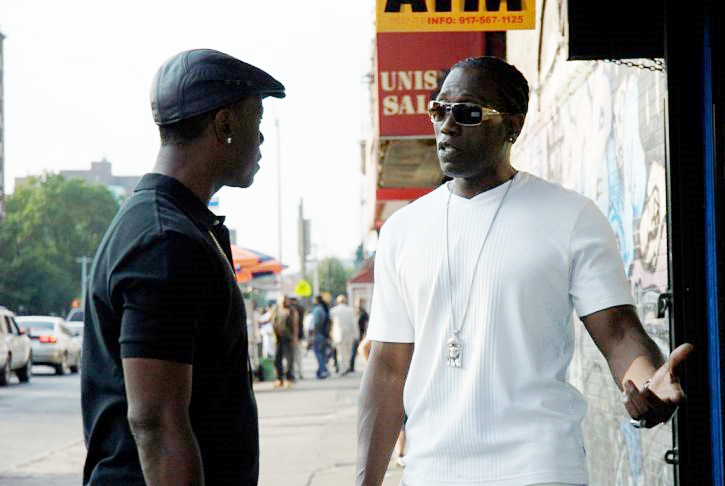
Suffer the Kings and Arrows.
In the trailer bin this morning, Russell Crowe grimaces once more for Ridley Scott as the titular character in his take on Robin Hood, also with Cate Blanchett (Maid Marian), Mark Strong (Evil Henchman), Max von Sydow (Pa Marian), Mark Addy (Friar Tuck), Kevin Durand (Little John), Oscar Isaac (King John), Danny Huston (Richard the Lionheart), and William Hurt (William Marshall).
Well…ok. But how many times have we seen this movie now? (Not the Robin Hood tale, but the King Arthur-ish “story behind the story” period war epic.) For that matter, how many times has Ridley Scott made this movie now? As such, it’s hard to get too excited about this.
Flynn Lives.

Update: “There’s a time dilation effect where time scales in the inside world about 50 times faster than it does in our world. So even though it’s been 20 years since Kevin disappeared, that’s been almost 1000 years in the computer.” Director Joseph Kosinski walks us through the teaser, shot-by-shot.
Oscar Disarmed.
Congrats to the 2010 Oscar winners, which I got…mostly right. The back-to-back Best Director and Best Picture wins for Kathryn Bigelow and The Hurt Locker were a nice surprise, particularly given all the grief the film’s been getting lately. (I was also kinda glad to see The Secret in Their Eyes upset the Best Foreign Film category, given that I didn’t much care for The White Ribbon. As for Sandra Bullock…well, ok. I’m still not seeing The Blind Side.
Where There’s a Whip.
Five movies this past weekend and I didn’t catch this one (although I did see the fun Tron: Legacy teaser): With Sam Rockwell’s Justin Hammer making an appearance, here’s the second trailer for Jon Favreau’s Iron Man 2. This is only two months away? Wow, that was fast.
Cold Danish.

Well, David Lynch…not so much. (I presume the reviewer was thinking of Twin Peaks, but there really aren’t very many Lynchian flourishes here — There’s no Roy Orbison, red lights, flaring matches, or dream logic to be had.) But Terribly Happy definitely wears its Coenesque heart on its sleeve, paying brief homage to three of the Coens’ oeuvre in the first three minutes. The movie begins exactly like No Country for Old Men — a grizzled voiceover talking about crime and the olden ways, over shots of the strangely forbidding Danish countryside. We are then warned, a la Fargo, that this is based on True Events. (In fact, it’s from a novel by Erling Jepsen — Before that, provenance unclear.) And, then we cut to behind a police car on a long stretch of highway, one that pretty quickly conjures reveries of Raising Arizona.
Of all the Coens’ output, tho’, Terribly Happy ultimately feels most like Blood Simple — a sordid tale of small-town crime, seedy bars, and village ne’er-do-wells. (See also: great small-bore, character-driven crime flicks like One False Move and A Simple Plan.) This is not to say that Terribly Happy is derivative, because it isn’t. Rather, the film feels like it tips its hat to its influences before setting off on its own quite unique story. (In fact, Happy seemed unique even tho’ this is the third fish-out-of-water crime story I’ve seen in a row, and despite its reliance on the tried-and-true “new cop in an old village” tradition that includes Hot Fuzz, The Wicker Man, the aforementioned Peaks, and any number of old-school Westerns.)
If it seems like I’m just comparing Terribly Happy to other movies rather than talking about the film itself…well, best not to give away too much. But, in brief: Robert (Jakob Cedergren) is a Copenhagen cop who had a little bit of a breakdown, and has subsequently been dispatched to the sticks to rehabilitate his name. In the tiny hamlet where he ends up, people say “Mojn” like Hawaiians use “Aloha.” The village elders play cards all night long, short-handed. A local woman (Lene Maria Christensen) keeps showing up at the station with new injuries. The entire town seems deeply frightened of her husband Jorgen (Kim Bodnia). A strange little girl (Mathilde Maack) insists on wheeling her squeaky baby carriage around at all hours of the night. And people keep disappearing…
So, yes, there’s something rotten in the State of Denmark — more than a few things actually. And, as you might expect, it is Robert’s task to get to the bottom of it all. But in the Danish lowlands, the bottom can be treacherous, and our White Hat here is, well, not entirely stable, particularly after a beer or six. In fact, he’s the type of fellow who might just draw on his own kitty-cat, especially when it also starts saying “Mojn” back at him. (And, really, can you blame him? It’s only a short step there to “I can haz…“)
Sure, there are a few tells along the way — the last five minutes are telegraphed pretty much from the start. Still, Terribly Happy definitely takes a few jags I was not expecting, and the journey is the reward regardless. It doesn’t have the artsy ambition of The White Ribbon (and I have yet to see the well-regarded A Prophet), but nonetheless, Terribly Happy is my favorite non-English-language film of the year so far. It is, simply put, a solid crime story, well-told. (And if you get a chance, check it out before the inevitable American remake.)
